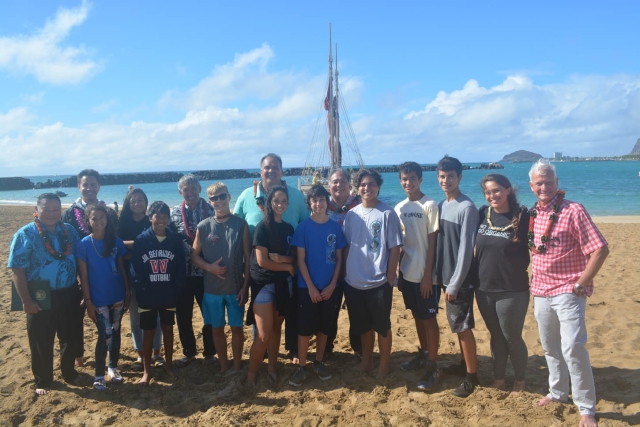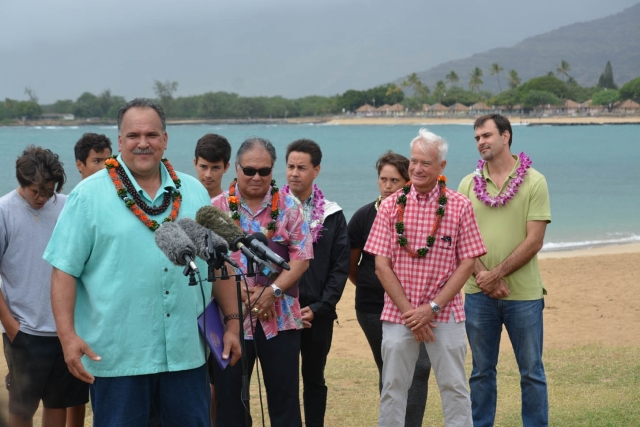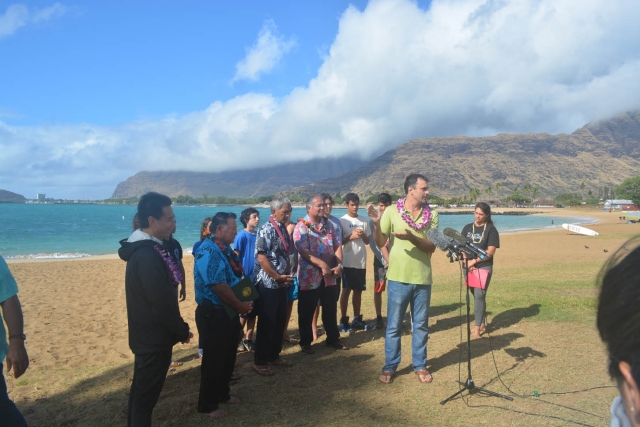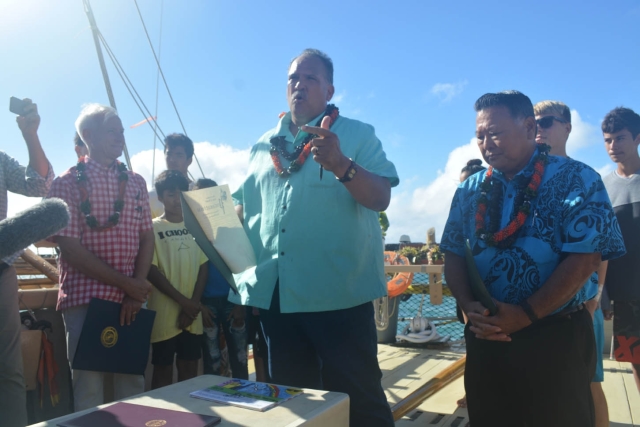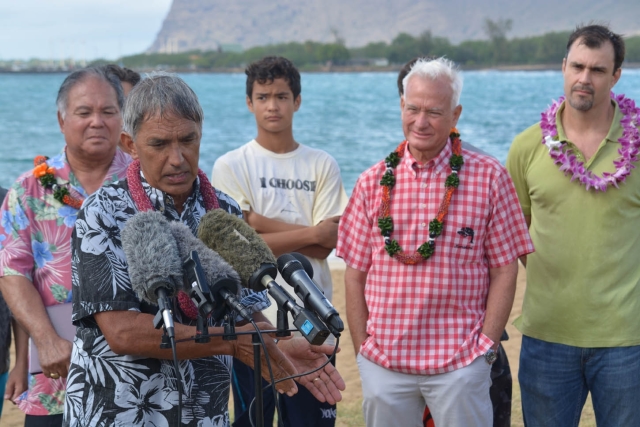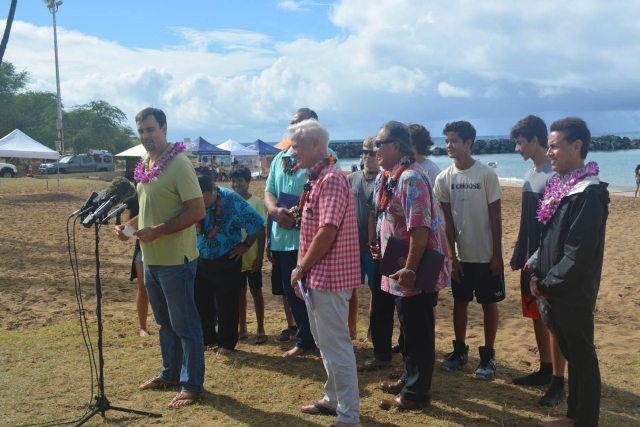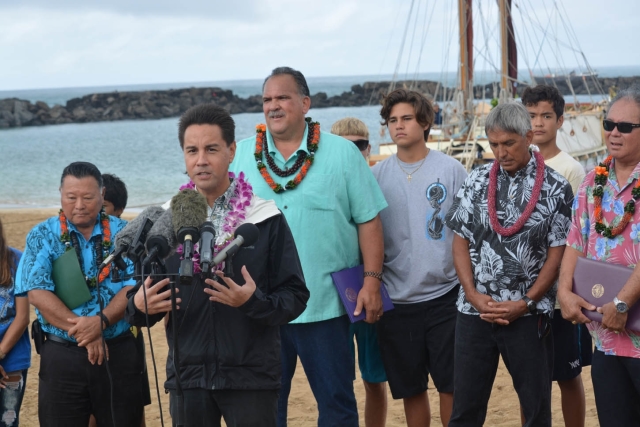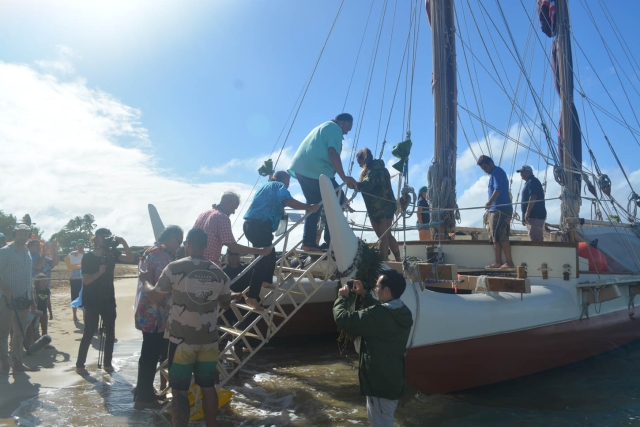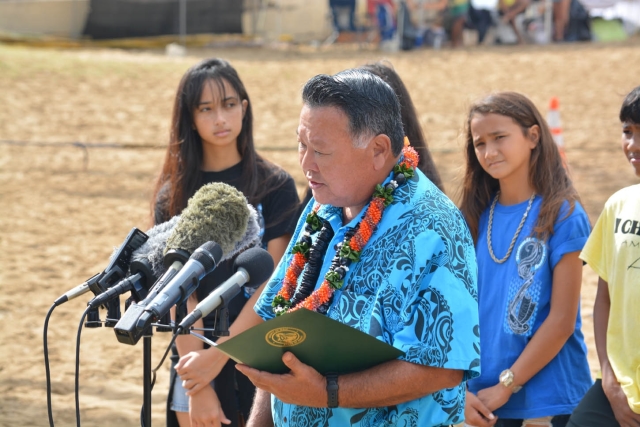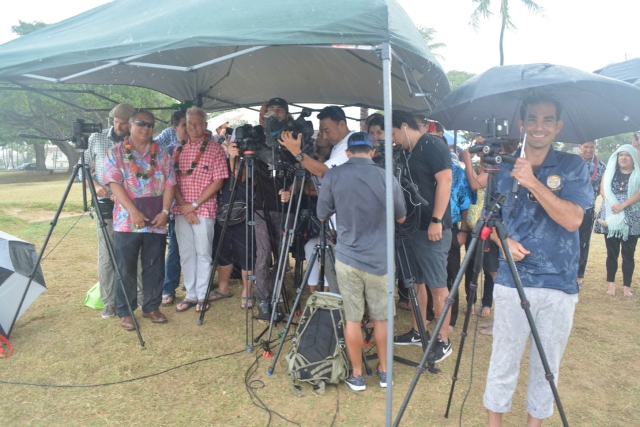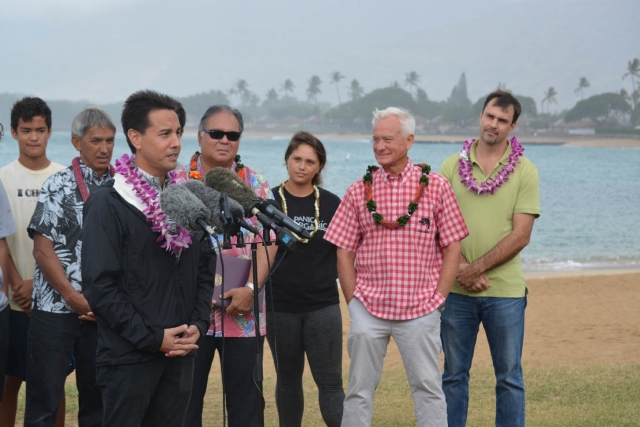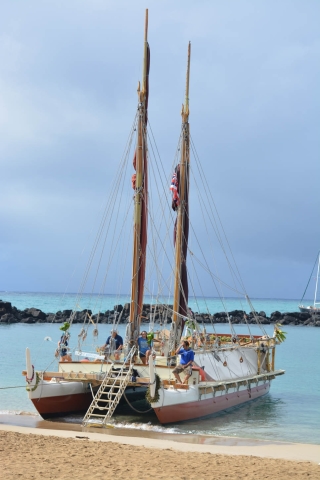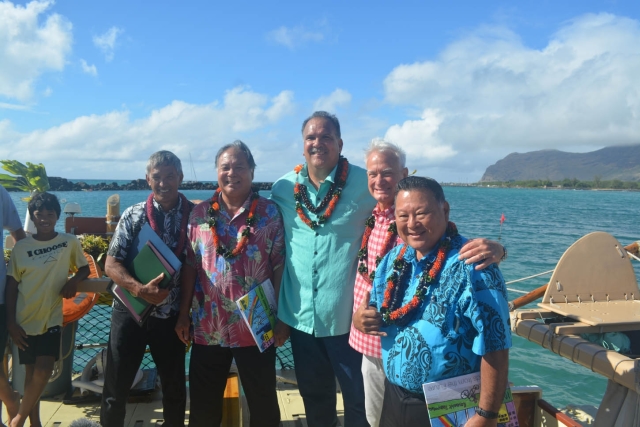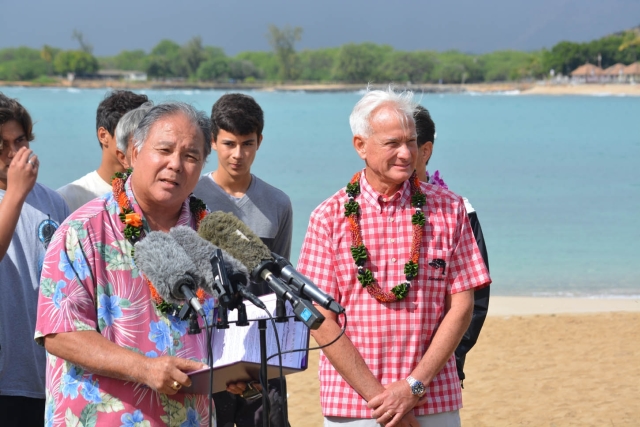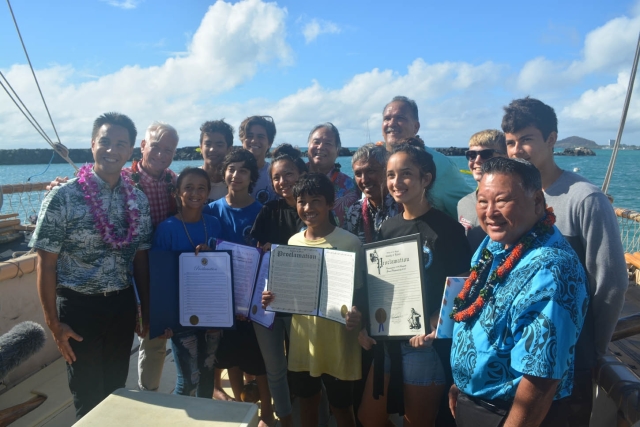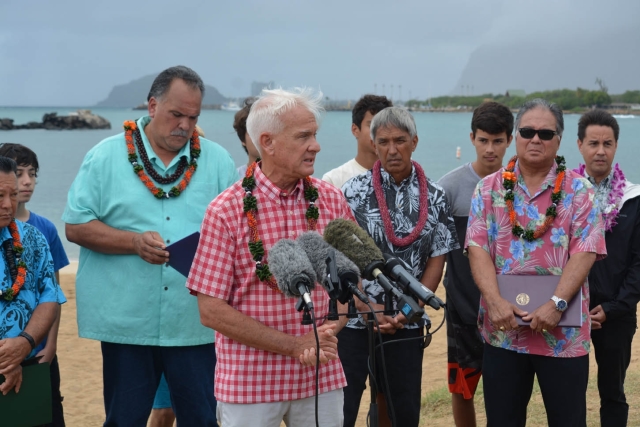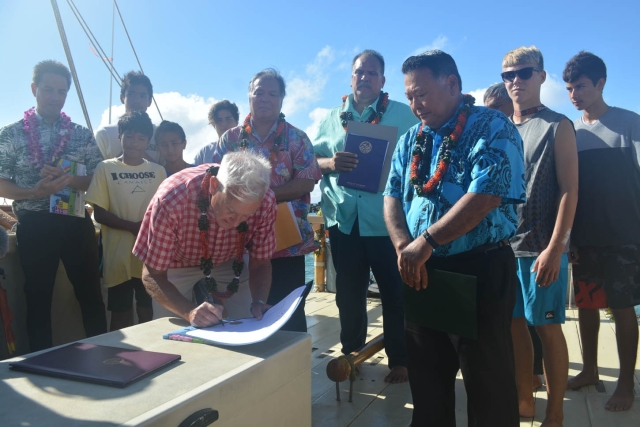
Hawaiʻi’s Mayors Commit to 100% Renewable Transportation
- Posted on 12 Dec 2017
- In News, Newsletter, Teachers, Updates
The following is a joint release from each of Hawaiʻi’s mayoral offices.
Aboard the deck of Hōkūleʻa, county leaders vow to transform Hawaiʻi’s public and private ground transportation to use completely renewable fuel sources by 2045
Leaders from the City and County of Honolulu, Maui County, Hawaiʻi County and Kauaʻi County came together today on the Polynesian voyaging canoe Hōkūleʻa in committing to transform Hawaiʻi’s public and private ground transportation to 100 percent renewable fuel sources by 2045.
Honolulu Mayor Kirk Caldwell, Maui County Mayor Alan Arakawa, Kauaʻi County Mayor Bernard P. Carvalho Jr. and Hawaiʻi County Managing Director Wil Okabe, representing Mayor Harry Kim, set the new target by signing their respective proclamations.
The mayors were joined by Master Navigator Nainoa Thompson in Pōkaʻī Bay on Oʻahu’s Leeward Coast to sign the proclamations on the captain’s box of the Hōkūleʻa, which promoted sustainability and resilience during its recent Mālama Honua voyage.
 “The stakes are too high for Oʻahu, as well as the rest of our state. We have to change our path,” said Mayor Caldwell. “With this announcement we want to send a message that we welcome the next phase of Hawaiʻi’s clean energy transformation, which will not only reduce our carbon dioxide emissions and fossil fuel imports, but will also ensure a more resilient future.”
“The stakes are too high for Oʻahu, as well as the rest of our state. We have to change our path,” said Mayor Caldwell. “With this announcement we want to send a message that we welcome the next phase of Hawaiʻi’s clean energy transformation, which will not only reduce our carbon dioxide emissions and fossil fuel imports, but will also ensure a more resilient future.”
The four mayors recognize that this pledge is a critical next step to energy sustainability since ground transportation accounts for over one-quarter of Hawaiʻi’s imported fossil fuel consumption and greenhouse gas emissions. It also represents a significant financial gain for our residents as operating and maintaining an electric vehicle costs about one-third less than a comparable vehicle powered by fossil-fuel.
In their specific proclamations the City and County of Honolulu, the County of Maui, and the County of Kauaʻi pledged to lead the way by transitioning all of their fleet vehicles to 100 percent renewable power by 2035, and the County of Hawaiʻi plans to establish a goal toward the same end.
 “It is vitally important that we chart a new course that steers us away from fossil fuel use and carbon emissions in our ground transportation,” said Maui Mayor Alan Arakawa. “The goals we are setting today are not only desirable, but attainable, and help send a message that Maui County and Hawaiʻi are open for innovation to help ensure the greater health of our communities and the planet as a whole.”
“It is vitally important that we chart a new course that steers us away from fossil fuel use and carbon emissions in our ground transportation,” said Maui Mayor Alan Arakawa. “The goals we are setting today are not only desirable, but attainable, and help send a message that Maui County and Hawaiʻi are open for innovation to help ensure the greater health of our communities and the planet as a whole.”
The signed proclamations solidify Hawaiʻi’s role as a global renewable energy leader, with the state and all four counties becoming the first in the nation to commit to a 100 percent renewable transportation future.
“Hawai’i County is committed to the goals of this initiative, and we will do everything we can to see it fulfilled,” said Hawai’i County Mayor Harry Kim.
The proclamations also continue Hawai‘i’s progress in transitioning away from fossil fuels and builds off a 2015 state law that requires 100 percent of Hawai‘i’s electricity to be generated by renewable sources by 2045. Hawai‘i’s 2045 goal was the nation’s first such benchmark.
 “It is our shared kuleana to reduce our emissions, no matter how big or small our communities may be,” stated Mayor Bernard Carvalho, Jr. “It is an ambitious goal, but by bringing everyone to the table to work together, we can achieve 100 percent affordable, safe, renewable transportation by 2045.”
“It is our shared kuleana to reduce our emissions, no matter how big or small our communities may be,” stated Mayor Bernard Carvalho, Jr. “It is an ambitious goal, but by bringing everyone to the table to work together, we can achieve 100 percent affordable, safe, renewable transportation by 2045.”
The four Hawaiʻi mayors join leaders in France, Great Britain, India, China, Dublin, Madrid, Oslo, Milan, Paris, and Brussels who have also committed to transition their transportation systems away from fossil fuels.
“Hōkūleʻa’s voyage around the world was dangerous, but the risk of inaction outweighed the risk of the voyage,” said Nainoa Thompson. “The call of Mālama Honua is being answered today by these four mayors who are continuing the legacy of the voyage and showing the world what local climate leadership looks like.”
Local businesses and clean energy organizations applauded the historic action by the four mayors.
“This initiative will spark innovation and entrepreneurship in our state,” said Sherry Menor-McNamara, President and CEO of the Chamber of Commerce Hawaiʻi. “We’ve seen how the renewable energy revolution in electricity has grown jobs and helped keep over $300 million every year in the local economy.”
“We commend the vision of these leaders in setting the course for Hawaiʻi’s sustainable transportation future,” said Jeff Mikulina, Executive Director of Blue Planet Foundation. “This goal has been one of the missing pieces in our clean energy puzzle.”
Background
While imported petroleum use for electricity generation has been decreasing over the past decade, due to the success of the public-private partnership to achieve a 100 percent renewable electrical grid by 2045, gasoline and diesel use in vehicles has grown in recent years.
The proclamations signed today by the chief executives of the four counties are in alignment with the state of Hawai‘i’s recent commitment to the goals of the Paris Climate Agreement that seeks to reduce greenhouse gas emissions and keep global warming below 1.5 degrees Celsius.
All four mayors previously joined Governor David Ige on June 5, 2017 to commit to uphold the Paris Climate Agreement just days after President Donald J. Trump announced he would withdraw the United States from the international accord to address global warming.
More recently, Mayor Caldwell returned from the North American Climate Summit last week where he signed the Chicago Climate Charter and met with former President Barack Obama, who encouraged U.S. mayors and local governments to lead the country in meeting the Paris Climate Agreement goals.
The City and County of Honolulu was recently selected by 100 Resilient Cities, pioneered by the Rockefeller Foundation, to be part of an international cohort of cities addressing the increased stresses and shocks of the 21st century. The city will be developing a “Resilience Strategy” in 2018 that will include how best to address climate change challenges on Oʻahu. Nainoa Thompson serves as a member of the Mayor’s Resilience Strategy Steering Committee.
